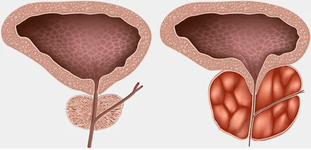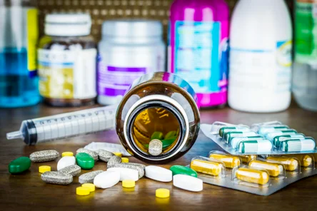
In the treatment of prostatitis, drug therapy is most often prescribed. During his passage, the patient must take medications of various categories. Some aim to eliminate the symptoms that cause discomfort, while others purposely act directly on the affected gland, eliminating what is most important - the root cause. At the same time, the medications differ in the strength of the effect, as some are designed to eliminate acute symptoms, while others are against chronic ones. Let's take a look at the most popular drugs used to treat inflammation of the prostate.
Types of drugs for prostatitis
All medications prescribed by the attending physician can be conditionally divided into several categories according to the method of administration:
- Pills and capsules- taken orally, moderately absorbed by the body, in the case of capsules absorption occurs much faster, as all components arrive at their destination after a short period oftime after the gelatinous shell dissolves.
- Injections- can be liquid and powder preparations, which are subsequently diluted in a working fluid, usually an anesthetic, administered intramuscularly or intravenously, and the effect may be noticeable after a few minutes. . .
- Rectal suppositories (suppositories)- have anti-inflammatory, antibacterial and analgesic effects, are administered to the patient in the rectum when he is on his side, and in this position he needs to spend about half an hour for the medicinebe completely dissolved and absorbed.
- Instillations- group of drugs that have a maximum positive effect only if they are administered directly to the affected prostate area; the method is used in a hospital environment, as the introduction is made through the urethra.
- Microclisers- as a rule, they include non-medicated drugs, for example, herbal decoctions, they cannot replace drug therapy, but they can be a good remedy for pain relief or prevention.

It is important to note that some types of medication can be marketed in different forms at the same time, for example, pills and suppositories, so the attending physician must indicate this characteristic without fail.
The most popular drugs for the treatment of prostatitis
Treating prostatitis with medication is a very complicated procedure that requires the doctor to select the right medications that will not only relieve pain and eliminate other symptoms with manifestations, but will also help to eliminate the root cause of the disease. The disease itself can also have a different origin, manifest itself in acute or chronic forms, and bring a wide range of inconveniences to the patient, limiting him both in natural matters and leading to total infertility.
Classic tablets, intramuscular injections and suppositories for rectal administration can be used to treat prostatitis. The choice of a drug depends directly on the need for urgent delivery of its components to the affected organ.
Additional tools
The treatment of prostatitis is not limited to a list of various drugs. Experts can also use other types of drugs from different categories.
Fluoroquinolones
Fluoroquinolones are antibacterial drugs used to treat prostatitis of tuberculous origin. These resources are used in a complex way, and the patient can receive a prescription for a course with four or more medications at the same time.
Cephalosporins
Cephalosporins are antimicrobial drugs that target specific types of bacteria.
These drugs can have a wide and targeted spectrum of action, and the need to use this or that remedy depends directly on the form of the disease and the cause of its occurrence.
Macrolides
Macrolides are rarely used in the treatment of prostatitis, as they are intended to fight certain types of bacteria, such as mycoplasma and chlamydia. By the way, a disease like chlamydia is usually accompanied by prostatitis, so doctors prescribe several tests at once to identify problems with the prostate in the early stages.
In acute manifestations of prostatitis, the attending physician may prescribe several drugs of various categories at the same time. This approach allows you to deal effectively with the symptoms and the disease itself.
Painkillers
The vast majority of analgesics are prescribed in the presence of acute pain syndrome, which is an integral companion of chronic prostatitis, but more often exacerbated. The use of drugs belonging to this group outside the scope of drug therapy in order to eliminate the disease is strictly discouraged, since the body gets used to them quickly, and to achieve an analgesic effect, an increase in the dose will be necessary, which can negatively affect the liver and kidneys. The course of painkillers is prescribed individually.
Alpha-blockers and muscle relaxants
The main task of these groups of drugs is to relieve tension in the spasmodic muscles of the bladder, the urethral canal and also to reduce pressure in the pelvic region. These remedies help to get rid of the discomfort and normalize the urination process.
Immunomodulators
These preparations basically contain natural ingredients, in the case of prostatitis - extracts based on bovine prostate tissues. Regardless of the drug, they all have a common principle of action, allowing:
- decreases the course of inflammatory processes;
- increases the tone of smooth muscles and bladder walls;
- to minimize the possibility of blood clots;
- improves blood circulation in the prostate;
- reduces the volume of the prostate.
Immunomodulators can be used for a variety of diseases, including chronic prostatitis, acute non-infectious prostatitis, prostate adenoma.
In addition, these funds are actively used for prophylactic purposes, which helps to prevent the disease from occurring or recurring.
Vitamins and dietary supplements
Means that fall into these categories can reduce inflammation, improve fluid drainage and eliminate congestion. The need for such drugs is also due to insufficient intake of beneficial nutrients, especially during treatment with antibiotics.
Prostatitis is a very complex disease that should only be treated by a real specialist. Self-selection of drugs is not strictly recommended, since with this approach there is a high likelihood of complications in the form of infertility, impotence and even the risk of developing cancer. The use of drugs for prostatitis without consulting a doctor can lead to the fact that it will be impossible to get rid of the disease without surgery. In addition, self-treatment is hampered by the impossibility of making an accurate diagnosis, since it requires adequate equipment and knowledge.
It should also be remembered that most drugs used to treat prostatitis are quite toxic and some types are simply incompatible. If you experience pain in the pelvic area during urination, defecation or ejaculation, go to the bathroom frequently and be unable to empty your bladder normally, do not take any chances - consult your doctor. Thus, you will not only avoid the unfavorable course of the disease, but you will be able to prevent the development of your chronic form, with which you will have to live your whole life. In addition, your sexual function will not be impaired and, with proper treatment, you can have a completely normal and healthy offspring.
























